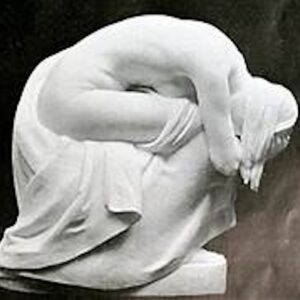It’s possible to read Rae Armantrout’s short poem ‘The Way’ as a kind of mock confessional epiphany poem that winds up with an actual (if ironized, meta-poetic) “epiphany” in which a postmodern artist estranged from the language-game of church-life finds a way to “be herself,” to be a poet, precisely by the kind of humorous, disjunctive play in the field of religious language that the poem itself performs.
In an interview, Armantrout relates that the first part of the poem (lines 1-10) is made with bits of found language culled from various sources and stitched together into an offbeat miniature collage; the second part is comprised of the poet’s own words. Here’s the whole poem:
“The Way”
Card in pew pocket
announces,
“I am here.”
I made only one statement
because of a bad winter.
Grease is the word; grease
is the way
I am feeling.
Real life emergencies or
flubbing behind the scenes.
As a child,
I was abandoned
in a story
made of trees.
Here’s the small
gasp
of this clearing
come “upon” “again”
The formulaic epiphany poem implied and parodied by ‘The Way’ would begin with an experience of presence, express a sense of the misery of one’s condition, then depict the arrival of grace, tied perhaps to some encounter with religious culture. I’m imagining a conventional poet in the pew of a church, after a “bad winter” of some kind, touched by and depicting the usual sort of graced epiphany, the poem moving from the memory of personal trauma (As a child, / I was abandoned) to the predictable “gasp” and relief of breakthrough in a neatly sewn up closing in which the one lost is found “again” within the familiar. This implied poet, back in church, feels connected and so inspired to write a conventional epiphany poem.
‘The Way,’ however, depicts a poet in the pew of a church alienated and out of place, who can’t help hearing ironic twists and absurd pop culture echoes in the bits of religious language that snag on her attention. No grace arrives, but ‘Grease’ does—an alternative to (or version of) “the way” and “the word” that is Christ. The “word” and “way” are the poet’s own offbeat sensibility greased and valorized by an unlikely inspiration. That is, the poem depicts a kind of anti-epiphany that becomes paradoxically an experience of the speaker actually finding her place vis-à-vis religious culture precisely as the sort of alienated poet who playfully highlights and ironizes the elements of that culture by which she feels estranged and excluded.
The appearance of “Grease” (the lyrics of the theme song to the movie in lines 6-8), suggests the validating creative inspiration that frees the poet to be herself, to make the particular, funny, offbeat subversive sort of poem she can from the materials she’s presented. The inspiration (or lubrication!) that validates the poet allows her to “come upon” or rather, carve out her own distinctive place for herself in relation to a once alienating religious culture. Genuine belief emerges not from the imposition of a storyline, but in the words of the Grease theme song: “We start believing now that we can be who we are.”
“I am here” introduces at once the first person speaker of the poem and God/Christ. The card is meant to remind congregants that God is present. The speaker’s a bit out of practice with church and doesn’t quite catch this right off. It reminds one of the statement on a map (“You are here”), meant to orient the viewer, but here occasions disorientation. The confusion of subject extends to the next line (which Armantrout relates, she overheard from a person who was “probably crazy” in a café): “I made only one statement / because of a bad winter,” which might equally express God’s apology to the poet for not sending much by way of grace/inspiration and/or the pang of an irregular churchgoer noticing the collection envelope next to the “card in pew pocket.” Together the lines suggest communication strained from both sides.
Right in this feeling of awkward strain, Grease arrives to inspire and lubricate, to validate the speaker in the making of her poem. (Have a listen to the song to get the feeling.) In the greased creative play where disjunctive pairings of pop and religious culture, found language, and parodied confessional lyric fuse, the speaker feels absurd, slick, slippery, audacious…. The feeling extends into both “real life” and representation, public performance and backstage “flubbing,” the poems that make it into print and the flubbed lines that remain “behind the scenes.”
The lines “As a child, / I was abandoned” appear to start off in a new direction, and form an extremely concise, mocking gesture towards the trauma-based confessional poem, one quickly subverted by “in a story” and further “made of trees.” We think we know where we’re going but then learn that the speaker was abandoned in a narrative, lost inside a story, as at the outset of the poem she is portrayed as “lost”: estranged from and confused by the encompassing religious storyline. The familiar is further nudged askew when we find that the “story” is “made of trees.” In connection with the Christian language (“I am” statements, “word,” “way”), “trees” could suggest crosses, in the sense of trials. Once I was lost but now I am found; I’ve been through many trials, I’ve come through the dark forest and come to the clearing of predictable epiphanic closure…. As at multiple points in the poem, with “the gasp” “of this clearing,” experience and representation fuse. The direct announcement of this mock breakthrough and its depiction (“Here’s the / gasp”) heightens the metapoetic (poem commenting on itself as poem) quality of the lines to the level of an absurd self-consciousness. The scare quotes on “upon” “again” further call attention to the language of the poem as language. The conventional lyric epiphany is presented as something one comes upon, something already there, where ‘The Way’ at every step underlines the constructed character of the poem/experience. The experience of grace, of being lost and found, carries an element of repetition; one is recognized, restored to the familiar “again,” the scare quotes serving to make the familiar strange, and call into question the givenness of such experience.
Of course the power of a poem like ‘The Way’ lies in the multiplicity of interpretations it invites. The reading I’ve sketched—the poet estranged from conventional faith (and poetry), finding her beat as playfully subversive ironist—is just one way (not THE Way) to connect some of the dots, one way through the story made of trees.
Originally from Toronto, Canada, Isaac (John) Slater, a Trappist monk at the Abbey of the Genesee in western NY, is the author most recently of Lean, a chapbook of poems, and Beyond Measure: the Poetics of the Image in Bernard of Clairvaux.





